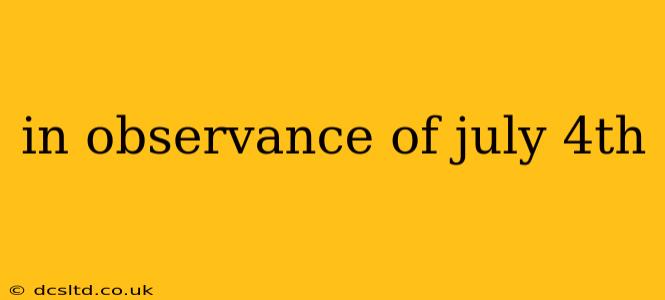July 4th, Independence Day, is more than just a long weekend and fireworks; it's a day to reflect on the birth of the United States of America and the ongoing pursuit of its founding ideals. This article delves into the history, traditions, and significance of this pivotal national holiday.
What is the significance of July 4th?
The significance of July 4th lies in its commemoration of the adoption of the Declaration of Independence by the Continental Congress in 1776. This document declared the thirteen American colonies independent from Great Britain, marking a pivotal moment in American history and the beginning of the fight for freedom and self-governance. It wasn't simply a declaration; it was an act of defiance, a bold statement against an established empire, and the foundation upon which the nation was built. The ideals expressed—life, liberty, and the pursuit of happiness—continue to resonate today, serving as both a source of pride and a constant reminder of the ongoing work towards achieving true equality and justice for all.
What events led up to July 4th?
The road to Independence Day was paved with years of escalating tensions between Great Britain and its American colonies. Increasing taxes and restrictive trade policies imposed by the British government, coupled with a growing sense of colonial identity and self-determination, ignited a firestorm of dissent. Events such as the Boston Massacre (1770) and the Boston Tea Party (1773) served as crucial catalysts, escalating the conflict and pushing the colonies closer to armed rebellion. The formation of the Continental Army and the battles of Lexington and Concord in 1775 marked the beginning of the American Revolutionary War, culminating in the momentous declaration of independence on July 4th, 1776.
What are some traditional July 4th activities?
Celebrating Independence Day involves a rich tapestry of traditions that have evolved over the years. The most ubiquitous symbols include fireworks displays, which light up the night sky with dazzling colors and spectacular patterns. Parades, often featuring marching bands, floats, and community members, showcase patriotism and community spirit. Barbecues and picnics bring families and friends together, enjoying delicious food and outdoor games. Many communities also host patriotic concerts, historical reenactments, and other events that commemorate the holiday's historical significance.
What does the Declaration of Independence say?
The Declaration of Independence is a powerful document that articulates the reasons for the American colonies' separation from Great Britain. It outlines the fundamental rights of individuals, including "life, liberty, and the pursuit of happiness," and asserts the principle of self-governance. It lists grievances against King George III and the British government, citing injustices and infringements upon colonial rights. The document's lasting impact stems from its profound statement of human rights and its justification for revolution, shaping the course of American history and influencing revolutionary movements worldwide. The full text is readily available online for those interested in reading it.
How is July 4th celebrated around the world?
While primarily a US national holiday, July 4th is celebrated by Americans living abroad and by those who admire the ideals of American independence. American embassies often host events, and many expatriate communities organize celebrations to maintain ties to their homeland. The holiday's themes of freedom and self-determination resonate globally, inspiring people in various countries to celebrate in their own ways.
What are some lesser-known facts about July 4th?
While the fireworks and parades are iconic, several lesser-known facts add depth to the understanding of this holiday. For example, the Declaration of Independence wasn't actually signed on July 4th; the final signed version appeared later. The holiday's official celebration wasn't immediately widespread; it took time for it to become a nationwide commemoration. Learning about these less-publicized aspects of the holiday provides a more nuanced appreciation for its historical development and lasting importance.
In conclusion, July 4th is a day of remembrance, celebration, and reflection. It is a time to honor the sacrifices made by those who fought for independence and to reaffirm the commitment to the ideals enshrined in the Declaration of Independence. Understanding the history, traditions, and significance of this holiday allows us to more deeply appreciate its enduring impact on the United States and the world.
